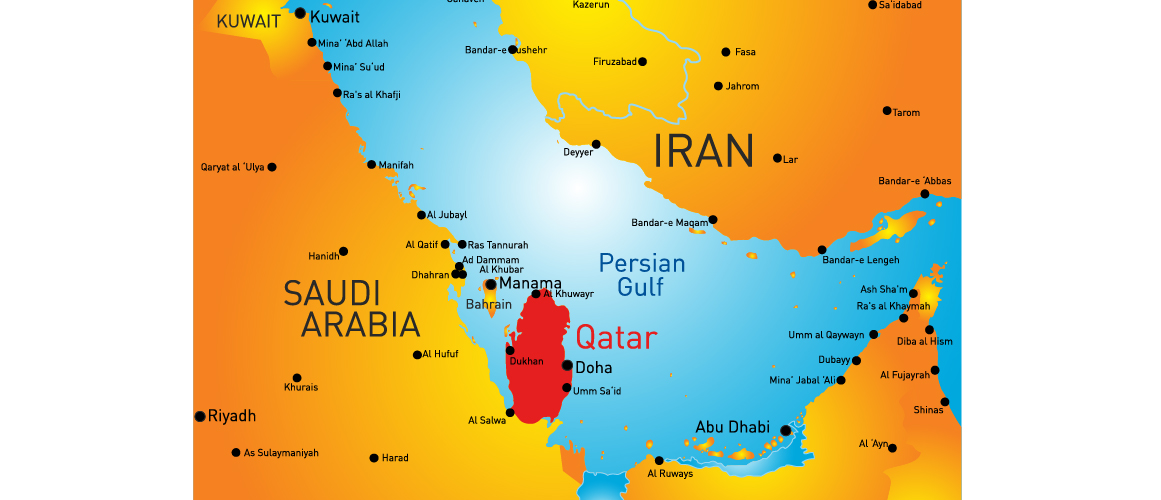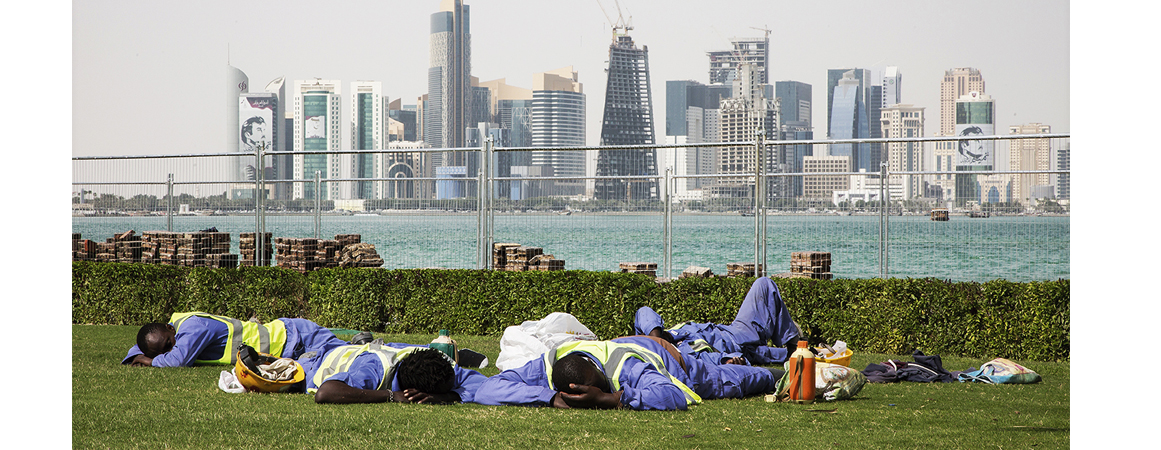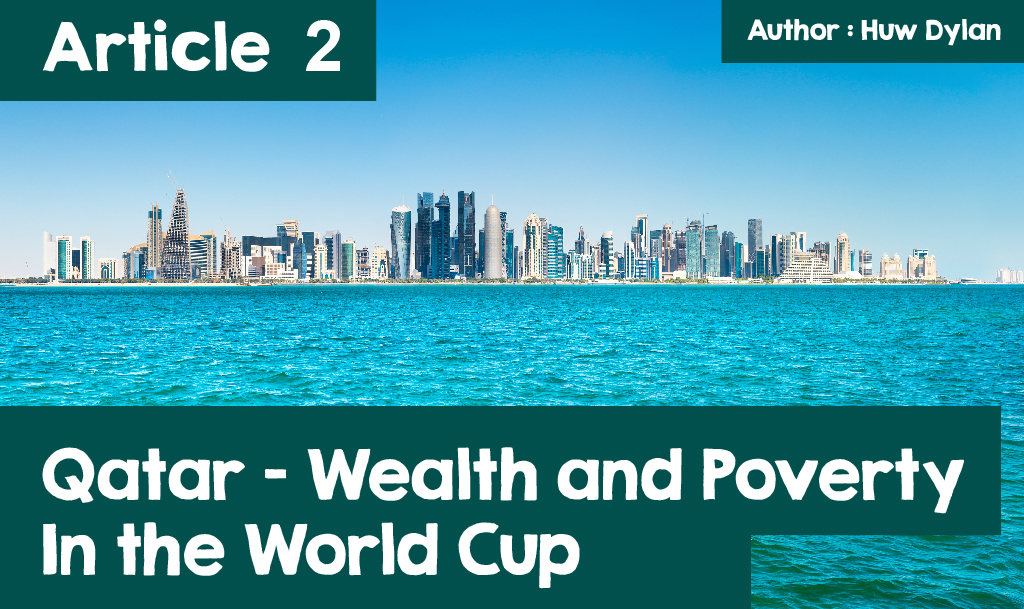Qatar – Wealth and Poverty in the World Cup
Yes, Wales reached the final rounds of the World Cup for the first time since 1958 to the delight of the Red Wall that has proved several disappointments over the years. However, we can finally look forward to seeing Wales compete on the international stage in Qatar in the autumn with the hope that the team will enjoy great success. And thousands of people are busy making preparations to go to Qatar to support them. But how much do we know about this country?

Map showing location of Qatar
Qatar is an Arabic country located on a peninsula where its land includes a harsh desert and long coast along the Persian Gulf which is full of beaches and dunes. The capital city, Doha, is also on the coast, and is renowned for its modernist architecture and buildings that were inspired by ancient Islamic design. In terms of population, it is slightly smaller than Wales with approximately 2.6 million people living there. Qatar is one of the world's richest countries due to its oil and gas resources that are exported to a large number of countries.
Arabic is the official language and the majority of Qatarians speak the Gulf Arabic dialect which is similar to what is spoken in nearby provinces. Modern Standard Arabic is taught in schools and English is commonly used. Persian and Urdu are spoken among the large exiled population.

Qatar Skyline
(©Ingimage)
In terms of its government, Qatar is a semi-constitutional monarchy with the Emir as head of state and chief executive, and the prime minister is the head of government. However, it is important to remember that Qatar is an Islamic country with the majority of its citizens belonging to a Salafi Muslim Wahabist organisation, with some 5-15% following Shia Islam. There is a right to follow other religions on the condition that they do not propagate and seek to turn Muslims away from Islam. Qatar's constitution notes that Islam is the state's religion and sharia shall be the "primary source" of legislation, although on a practical level, the legal system is a mix of the country's civil law and sharia law. Although Qatar is not one of the strictest Muslim countries, the influence of sharia can be seen in many aspects of the country, particularly in familial, inheritance law and in terms of punishment for a number of offences, which includes capital punishment and physical punishment. Capital punishment is issued for any threat to the safety of Qatar and for espionage. Lying against Islam, a homosexual relationship and blasphemy are offences where capital punishment can be issued but there is no record that this has ever been carried out for those offences. A physical punishment namely whipping or lashing is mainly issued for consuming alcohol or having a sexual relationship out of wedlock, which is contrary to Islamic beliefs. Despite this, the major hotels in Qatar are permitted to sell alcohol to their guests but only within the hotel. Advice is also provided to tourists regarding how to respect decency in Islam in terms of outfit. It is strongly suggested that female tourists do not wear leggings, mini skirts, sleeveless dresses or tight clothing in public and men are warned not to wear shorts and vests.
In terms of sports, football is the most popular in Qatar in terms of the number of players and supporters. Qatar joined FIFA in 1970 and this is the first time for the country to compete in the final rounds of the World Cup. On 2 December 2010, Qatar succeeded in their bid to host the FIFA World Cup 2022 and this was greatly welcomed in the Persian Gulf region as it was the first time for a Middle Eastern country to be selected to host the competition. However, there has been much debate regarding the bid, including allegations of bribery and interference in the investigation into the alleged bribery.

Fifa World Cup Qatar 2022 - Branding Logo
(© FIFA WORLD CUP)
Although the Qatar World Cup 2022 has often been described as the millionaires' World Cup, not everyone in the country will have any part in that wealth by any means. This is why organisations such as Amnesty International have spoken out against hosting the competition in a country where there is so much poverty and restriction on basic human rights. The lack of labour rights has created widespread poverty in Qatar, especially among migrants.
The reason poverty remains among workers is the kafala sponsorship system. Migrants must apply for visas by employers, who often have to pay costs via recruiters in order to do so. Even if workers manage to pay sufficiently to access a job, employers have complete control over what workers can do. Employers often take passports from workers, which prevent them from escaping cruel conditions. Also, some workers have to get by on very little salary. This has led to hundreds of thousands of people living in labour camps, where disease and poverty are rife.
Since the announcement that Qatar would host World Cup 2022, the influx of migrants to the country has largely increased. Since 2010, Qatar has attempted to bring thousands of workers to the country to assist to construct football stadiums, hotels and other provisions that are necessary to facilitate the competition. In order to meet this demand, 700,000 workers alone came from India.
However, the poverty of migrants in Qatar has become a significant problem. Many of these workers face conditions that are similar to involuntary slavery. Some of the most common labour rights' offences include beating, withholding payments, charging workers for benefits that are the responsibility of the employer, restrictions on freedom of movement (such as confiscating passports, travel documents or leaving permits), threats of legal action and sexual assaults. Many migratory workers who arrive in Qatar for work have paid unreasonable fees to recruiters in their home nations.

Workers sleep in the sun as construction continues in Doha
(© Josimar/Faiz Abu Rmeleh)
On 30 August 2020, Qatar announced two new legal revisions in order to rectify this matter. The first was increasing the current minimum wage. The law came into force in January 2021 and it also requires employers to contribute towards their employees' food and accommodation. The second was an act to allow workers to leave their posts without specific permission from their employers. This change can enable workers to escape dangerous conditions and find better employment. Such revisions may have even saved lives as even the lowest estimations note that at least 1,200 people have died working on World Cup stadiums due to harsh conditions. International protection bodies have commended these revisions. Amnesty International has argued that these small steps provide some hope that the poverty of migrants in Qatar, along with the poverty and injustice faced by workers, will soon be at a low ebb.
Many people would question how a country that claims to be an Islamic country can allow such injustice to exist on its own doorstep. The Islamic religion teaches that everything belongs to Allah, including wealth and, therefore, money should be used responsibly. It also teaches that Muslims must be compassionate as everyone has been specially created by Allah. Therefore, giving to charities and helping others are considered good deeds. For Muslims, poverty is not part of Allah's goal and, therefore, they have a responsibility to ensure that wealth generated by Allah is fairly distributed. It is clear that Qatarian authorities are not very willing to shoulder this responsibility and are therefore open to be accused of being an Islamic country in name only.


